- He was prolific and talented, but maintained his reputation as a regular guy
- Hoffman thanked his mom when he won an Oscar for "Capote"
- He was an actor's actor; he knew how and when to let others have the spotlight
(CNN) -- He was -- in every sense of the word -- Hollywood royalty, with critically acclaimed performances in some of the biggest films of the last decade and friendships with A-list actors.
Even so, there was something about Phillip Seymour Hoffman that made him so identifiable to so many.
What made Hoffman different?
1. He made some of our favorite movies
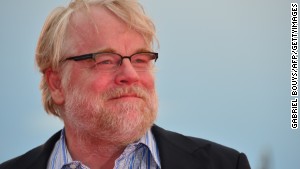 Some of his memorable scenes
Some of his memorable scenes 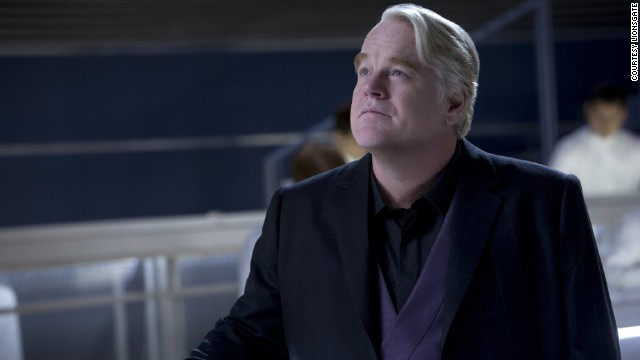 Philip Seymour Hoffman appears in 2013's "The Hunger Games: Catching Fire." Hoffman played the role of Plutarch, the head game maker in the film. He was expected to also appear in the following films of the very successful franchise. He was found dead in his Manhattan apartment Sunday of an apparent drug overdose. Click through for more highlights from his career:
Philip Seymour Hoffman appears in 2013's "The Hunger Games: Catching Fire." Hoffman played the role of Plutarch, the head game maker in the film. He was expected to also appear in the following films of the very successful franchise. He was found dead in his Manhattan apartment Sunday of an apparent drug overdose. Click through for more highlights from his career: 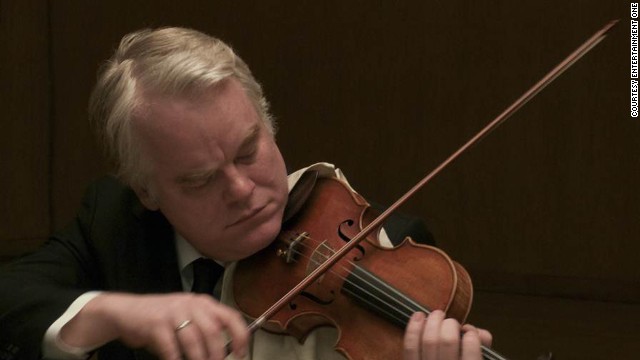 Hoffman appears in 2012's "A Late Quartet." He reportedly learned how to play the violin during his role as a member of a string quartet. He told the Huffington Post that "I really got into the violin thing, because it's not acting, and I got off on that."
Hoffman appears in 2012's "A Late Quartet." He reportedly learned how to play the violin during his role as a member of a string quartet. He told the Huffington Post that "I really got into the violin thing, because it's not acting, and I got off on that." 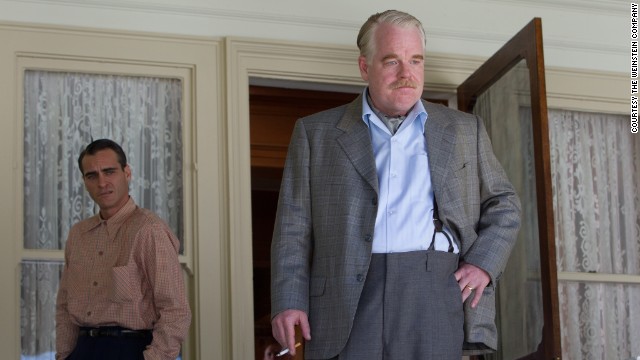 Hoffman appears with Joaquin Phoenix in "The Master" (2012). He received Oscar and Golden Globe nominations in the supporting actor category for his work in the film.
Hoffman appears with Joaquin Phoenix in "The Master" (2012). He received Oscar and Golden Globe nominations in the supporting actor category for his work in the film. 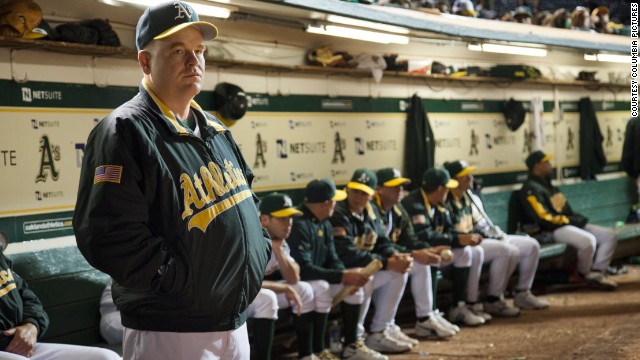 Hoffman plays manager Art Howe in the 2011 hit "Moneyball." The real Art Howe was reportedly not pleased with how he was portrayed in the film but told TMZ Sports he didn't blame Hoffman. "He was just playing the part he was given," Howe said.
Hoffman plays manager Art Howe in the 2011 hit "Moneyball." The real Art Howe was reportedly not pleased with how he was portrayed in the film but told TMZ Sports he didn't blame Hoffman. "He was just playing the part he was given," Howe said. 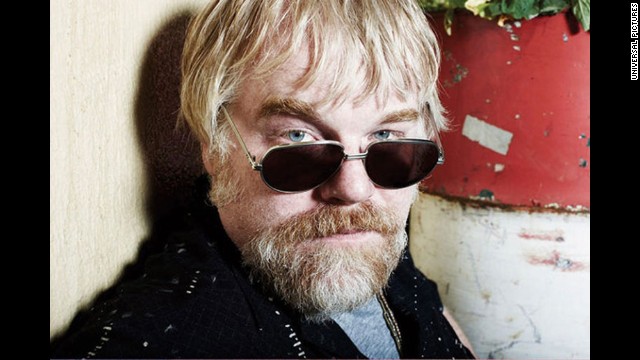 Hoffman plays a DJ known as The Count in 2009's "Pirate Radio."
Hoffman plays a DJ known as The Count in 2009's "Pirate Radio." 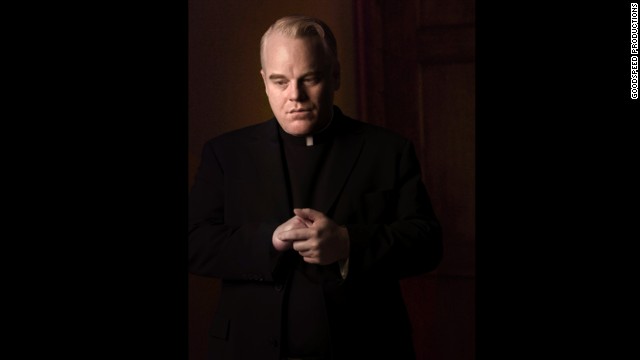 In 2008's "Doubt," Hoffman plays Father Brendan Flynn, a Catholic priest accused of having an inappropriate relationship with a male student. This was yet another film that got Hoffman supporting actor nominations for the Oscars and the Golden Globes.
In 2008's "Doubt," Hoffman plays Father Brendan Flynn, a Catholic priest accused of having an inappropriate relationship with a male student. This was yet another film that got Hoffman supporting actor nominations for the Oscars and the Golden Globes. 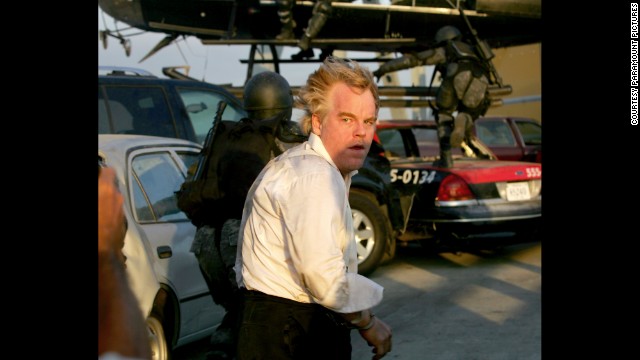 Hoffman plays Owen Davian in 2006's "Mission: Impossible III." The actor told AOL at the time that while an action film was not usually his type of role, "it was just one of those things where all the ingredients seemed right."
Hoffman plays Owen Davian in 2006's "Mission: Impossible III." The actor told AOL at the time that while an action film was not usually his type of role, "it was just one of those things where all the ingredients seemed right." 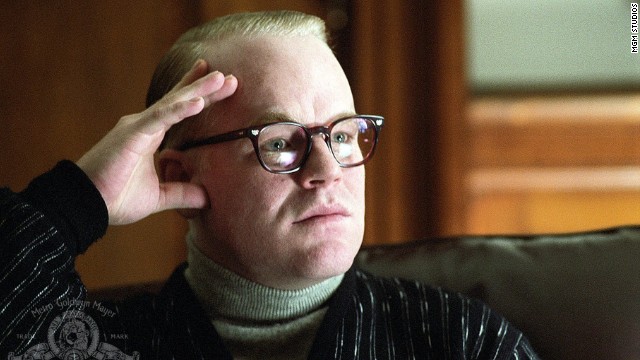 Hoffman plays the title role in 2005's "Capote." He won the Oscar for best actor in a leading role for his performance as Truman Capote, who wrote "In Cold Blood." Hoffman also won a Golden Globe for the role.
Hoffman plays the title role in 2005's "Capote." He won the Oscar for best actor in a leading role for his performance as Truman Capote, who wrote "In Cold Blood." Hoffman also won a Golden Globe for the role. 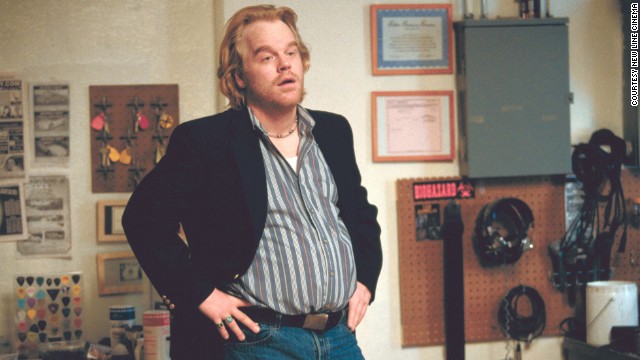 Hoffman plays a phone sex-line supervisor and mattress store owner in 2002's "Punch-Drunk Love."
Hoffman plays a phone sex-line supervisor and mattress store owner in 2002's "Punch-Drunk Love." 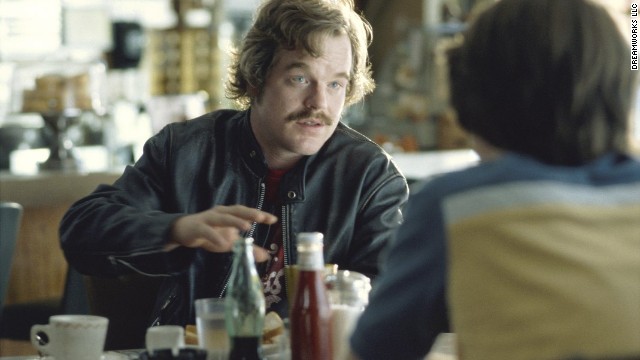 Hoffman plays Lester Bangs in 2000's "Almost Famous." He delivers one of the film's most memorable scenes when he advises Patrick Fugit's character, William Miller, that "the only true currency in this bankrupt world is what we share with someone else when we're uncool."
Hoffman plays Lester Bangs in 2000's "Almost Famous." He delivers one of the film's most memorable scenes when he advises Patrick Fugit's character, William Miller, that "the only true currency in this bankrupt world is what we share with someone else when we're uncool." 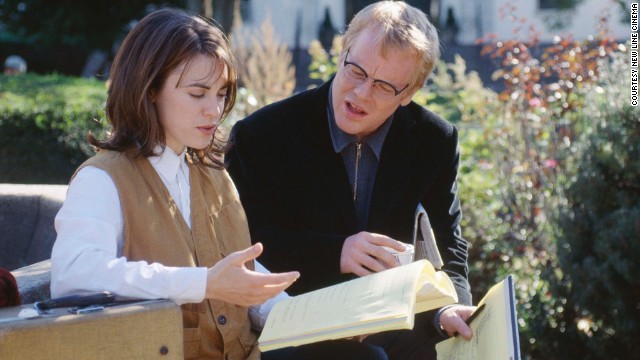 Hoffman appears with Rebecca Pidgeon in 2000's "State and Main." He plays a screenwriter suffering from writer's block.
Hoffman appears with Rebecca Pidgeon in 2000's "State and Main." He plays a screenwriter suffering from writer's block.  Jude Law and Hoffman share a scene in 1999's "The Talented Mr. Ripley." Hoffman was hailed as a scene stealer in the psychological thriller set in Italy.
Jude Law and Hoffman share a scene in 1999's "The Talented Mr. Ripley." Hoffman was hailed as a scene stealer in the psychological thriller set in Italy. 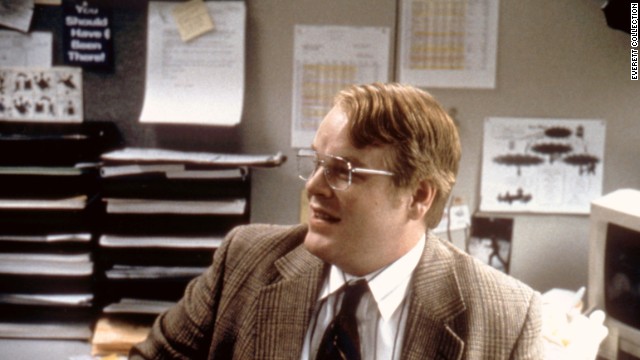 Hoffman in 1998's comedy-drama "Happiness."
Hoffman in 1998's comedy-drama "Happiness." 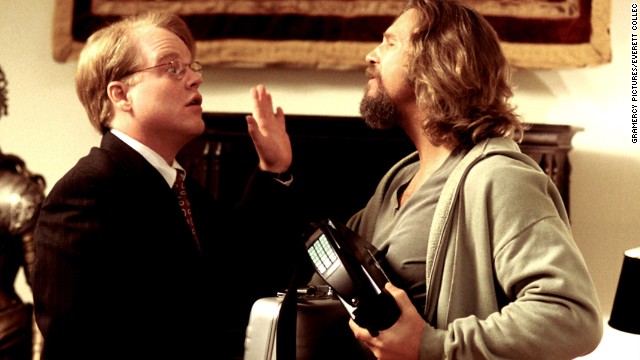 Hoffman plays Brandt, Mr. Lebowski's personal assistant, in the 1998 cult comedy hit "The Big Lebowski."
Hoffman plays Brandt, Mr. Lebowski's personal assistant, in the 1998 cult comedy hit "The Big Lebowski." 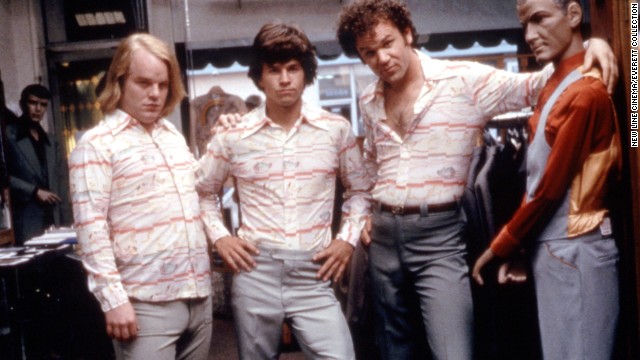 Hoffman played the slightly creepy production assistant Scotty in 1997's "Boogie Nights," with Mark Wahlberg and John C. Reilly.
Hoffman played the slightly creepy production assistant Scotty in 1997's "Boogie Nights," with Mark Wahlberg and John C. Reilly. 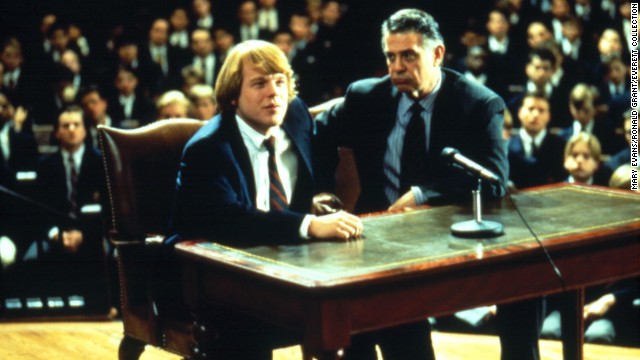 Hoffman plays George Willis Jr. in 1992's "Scent of a Woman." He is credited as Philip S. Hoffman in the movie.
Hoffman plays George Willis Jr. in 1992's "Scent of a Woman." He is credited as Philip S. Hoffman in the movie.  Philip Seymour Hoffman: Master of the screen
Philip Seymour Hoffman: Master of the screen Make a list of your all-time favorite films and, chances are, several of Hoffman's are there.
As prolific as he was talented, Hoffman is best-known for his portrayal as writer Truman Capote in the 2005 biopic "Capote." It earned him an Academy Award.
He also stole the screen in "The Master," "Doubt" and "Charlie Wilson's War."
But his films weren't always so serious. Hoffman could wear his roles as light as caps.
Remember "Boogie Nights?" Or "Along Came Polly?"
Hoffman was the sort of actor that no matter who else was in the film, or what his part was, if you saw he was in the cast, you knew it had to be good.
2. Mr. Hollywood, he was not
Hoffman was one of us.
For all his larger-than-life roles, he had a reputation as a regular guy. He didn't live in a mansion in Hollywood but rather an apartment in New York.
He sent his children to public school, and he was routinely seen walking them there, said CNN's Rose Arce, who lived two blocks from the actor in Manhattan's Greenwich Village.
"He'd go quietly about his business with his children," she said. "It's shocking, and I know everyone in the neighborhood is going to feel like they're missing a friend, like a friend has died."
Hoffman was often seen taking the subway, wearing a ball cap to avoid the paparazzi.
3. He was an accomplished stage actor
Hoffman got his start on the stage while studying drama at New York University, where he was a founding member of the short-lived Bullstoi Ensemble theater company.
He earned two Tony nominations, one for best actor in the 2000 revival of Sam Shepard's "True West" and another for best actor in the revival of Eugene O'Neill's "Long Day's Journey Into Night."
He was a founding member of the Labyrinth Theater Company, where he served on the board of directors and directed productions. One of the final plays he directed for the company was the 2013 off-Broadway production of "A Family For All Occasions."
Asked once during a 2008 interview with the IFC network if he thought it would be a challenge to introduce new generations to live theater, he said, "It might change, it might evolve, but I don't think it'll become too niche because the business of theater is still everywhere."
4. No part was too small, too weird or too evil
Hoffman could play a great leading man, but he shone in smaller parts too and never shied away from playing conflicted -- sometimes downright unlikeable -- characters.
Who forget his turn as Freddie Miles in "The Talented Mr. Ripley?"
Or as a creepy gamemaster in the latest "Hunger Games" movie? The near perfect villain in "Mission: Impossible III?"
Hoffman knew how and when to let others have the spotlight. He was an actor's actor.
5. He didn't forget his mom
Who doesn't love a man who loves his mom?
When Hoffman took the stage to accept his Oscar for best actor for "Capote," he remembered his roots.
He thanked his mom for taking him to his first play and for doing so much for him and his siblings.
"She brought up four kids alone and she deserves a congratulations for that. Ah, we're at the party, Ma, you know? And she took me to my first play and she stayed up with me and watched the NCAA Final Four, and my passions, her passions became my passions. And, you know, be proud, Mom, because I'm proud of you and we're here tonight and it's so good," Hoffman said.
What made you love Hoffman? Share your take in the comments section below.
















No comments:
Post a Comment